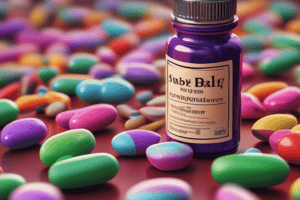Podcast
Questions and Answers
What is an ACE inhibitor?
What is an ACE inhibitor?
- Promotes vomiting
- Relieves pain
- Lowers blood pressure (correct)
- Increases cholesterol
What type of drug is an amphetamine?
What type of drug is an amphetamine?
Central nervous system stimulant
What does an analgesic do?
What does an analgesic do?
Relieves pain
What is the primary function of an androgen?
What is the primary function of an androgen?
What does an anesthetic do?
What does an anesthetic do?
What is the function of an angiotensin II receptor blocker?
What is the function of an angiotensin II receptor blocker?
What does an antacid do?
What does an antacid do?
What is the role of an antiandrogen?
What is the role of an antiandrogen?
What does an antiarrhythmic drug do?
What does an antiarrhythmic drug do?
What is the definition of an antibiotic?
What is the definition of an antibiotic?
What does an anticoagulant do?
What does an anticoagulant do?
What is the function of an anticonvulsant?
What is the function of an anticonvulsant?
What does an antidepressant do?
What does an antidepressant do?
What is an antidiabetic drug used for?
What is an antidiabetic drug used for?
What does an antidiarrheal do?
What does an antidiarrheal do?
What does an antiemetic do?
What does an antiemetic do?
What is the function of an antihistamine?
What is the function of an antihistamine?
What does an antinauseant do?
What does an antinauseant do?
What is the role of an antiplatelet?
What is the role of an antiplatelet?
What does an antiulcer drug do?
What does an antiulcer drug do?
What is the function of an antiviral drug?
What is the function of an antiviral drug?
What does an aromatase inhibitor do?
What does an aromatase inhibitor do?
What is the definition of a bactericidal drug?
What is the definition of a bactericidal drug?
What does a bacteriostatic drug do?
What does a bacteriostatic drug do?
What is the role of a beta-blocker?
What is the role of a beta-blocker?
What does a bisphosphonate do?
What does a bisphosphonate do?
What is the effect of caffeine?
What is the effect of caffeine?
What does a calcium channel blocker do?
What does a calcium channel blocker do?
What is the definition of a cardiac glycoside?
What is the definition of a cardiac glycoside?
What is the function of a cardiovascular drug?
What is the function of a cardiovascular drug?
What does a cathartic do?
What does a cathartic do?
What is a cholesterol-binding drug used for?
What is a cholesterol-binding drug used for?
What does a cholesterol-lowering drug do?
What does a cholesterol-lowering drug do?
What is the role of a diuretic?
What is the role of a diuretic?
What does an emetic do?
What does an emetic do?
What is an endocrine drug?
What is an endocrine drug?
What does a gastrointestinal drug do?
What does a gastrointestinal drug do?
What is the function of a glucocorticoid?
What is the function of a glucocorticoid?
What does a hypnotic do?
What does a hypnotic do?
What does a laxative do?
What does a laxative do?
What is a narcotic?
What is a narcotic?
What is the role of a progestin?
What is the role of a progestin?
What does a purgative do?
What does a purgative do?
What is the purpose of a respiratory drug?
What is the purpose of a respiratory drug?
What is a sedative?
What is a sedative?
What is a stimulant?
What is a stimulant?
Study Notes
Pharmacology Classes of Drugs
- ACE Inhibitor: Lowers blood pressure; used for hypertension treatment.
- Amphetamine: Central nervous system stimulant; increases alertness and energy.
- Analgesic: Relief from pain; can be non-opioid or opioid.
- Androgen: Male hormone; responsible for male sexual characteristics.
- Anesthetic: Reduces or eliminates sensation; can be general or local.
- Angiotensin II Receptor Blocker: Lowers blood pressure by preventing angiotensin from acting on blood vessel receptors.
Gastrointestinal and Metabolic Drugs
- Antacid: Neutralizes stomach acid; used for heartburn and indigestion.
- Antiandrogen: Slows uptake or effects of androgens; used in hormone-sensitive conditions.
- Antiarrhythmic: Treats abnormal heart rhythms; stabilizes cardiac electrical activity.
- Antibiotic: Destroys or inhibits foreign organisms; vital in treating bacterial infections.
- Anticoagulant: Prevents blood clotting; crucial in managing thrombosis risks.
- Anticonvulsant: Prevents convulsions; often prescribed for epilepsy.
- Antidepressant: Relieves symptoms of depression; alters neurotransmitter levels.
- Antidiabetic: Prevents diabetes mellitus; regulates blood glucose levels.
- Antidiarrheal: Prevents diarrhea; useful in gastrointestinal disturbances.
Symptomatic and Side Effect Management
- Antiemetic: Prevents nausea and vomiting; often used in chemotherapy.
- Antihistamine: Blocks histamine action; mitigates allergy symptoms.
- Antinauseant: Relieves nausea and vomiting; similar to antiemetics.
- Antiplatelet: Reduces platelet clumping; decreases risk of clot formation.
- Antiulcer: Inhibits stomach acid secretion; used in ulcer management.
- Antiviral: Acts against viruses; effective for conditions like herpes and HIV.
Hormonal and Bone Health Medications
- Aromatase Inhibitor: Lowers estrogen by blocking aromatase enzyme; used in breast cancer treatment.
- Bactericidal: Kills bacteria; used in various infections.
- Bacteriostatic: Inhibits bacterial growth; halts reproduction rather than killing bacteria.
- Beta-blocker: Blocks epinephrine effects; lowers heart rate and blood pressure.
- Bisphosphonate: Prevents bone loss; often prescribed for osteoporosis.
- Caffeine: Central nervous system stimulant; enhances mental alertness.
- Calcium Channel Blocker: Blocks calcium entry into heart and blood vessels; lowers blood pressure.
Cardiovascular and Renal Drugs
- Cardiac Glycoside: Increases heart contraction force; used in heart failure treatment.
- Cardiovascular Drug: Acts directly on heart and blood vessels; includes antihypertensives.
- Cathartic: Relieves constipation; induces bowel movements.
- Cholesterol-binding Drug: Prevents dietary cholesterol absorption.
- Cholesterol-lowering Drug: Reduces liver-produced cholesterol; commonly statins.
- Diuretic: Increases urine production; reduces body fluid volume, used in hypertension management.
Action-Inducing Drugs
- Emetic: Promotes vomiting; used in specific poisoning cases.
- Endocrine Drug: Hormone or hormone-like substance; impacts endocrine functions.
- Gastrointestinal Drug: Treats GI tract diseases; improves digestive health.
- Glucocorticoid: Raises blood sugar and reduces inflammation; used in inflammatory conditions.
- Hypnotic: Induces sleep or trance-like state; used for sleep disorders.
- Laxative: Mild cathartic; assists in relieving constipation.
Pain Management and Sedation
- Narcotic: Habit-forming pain reliever; induces stupor or insensibility.
- Progestin: Female hormone that supports uterine lining; used in hormone therapies.
- Purgative: Strong cathartic; effectively cleanses bowels.
- Respiratory Drug: Treats respiratory conditions like asthma and emphysema.
- Sedative: Mildly hypnotic; relaxes without necessarily inducing sleep.
- Stimulant: Increases alertness; enhances physical or mental activity.
Studying That Suits You
Use AI to generate personalized quizzes and flashcards to suit your learning preferences.
Description
This quiz features flashcards on various classes of drugs and their definitions. Each card provides a term along with its explanation, making it an excellent study tool for pharmacology students. Enhance your understanding of essential pharmacological terms.




